#parrot dinosaur
Explore tagged Tumblr posts
Text

This is Ellie yawning next to a Jurassic Park poster!
If you see this picture, you are guaranteed to have something nice happen to you tomorrow!
Ellie says hello and that she loves you! I know because I asked!
3K notes
·
View notes
Text

Lucky experienced his first snow day today! It was very fun seeing her look out the window. (Way too cold for them to actually go outside!)
153 notes
·
View notes
Text

Old Messelastur gratulator commission. By Christopher Rigobello.
103 notes
·
View notes
Text
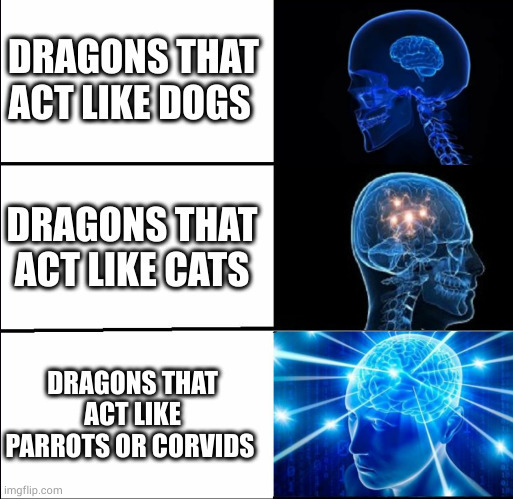
Hot take
#i like my dragons sentient and we already have highly intelligent flying dinosaurs Right There 🦜🐦⬛#can you imagine how terrifying a bored lovebird the size of an elephant would be ?#that's not to say i don't enjoy dragons with cat-like traits i just think there's a missed opportunity#dragons#birds are dinosaurs#parrots#corvids#birblr#fantasy#here be dragons
213 notes
·
View notes
Text
Spectember/Spectober 2023 #09: Things With Wings
(Apologies for the abrupt absence – I'm okay, just having everything break down at once. This is fine.)
So— back to the speculative evolution request list!
@thebigdeepcheatsy requested a "cactus-dwelling/germinating evolution of introduced rosy-faced lovebirds":
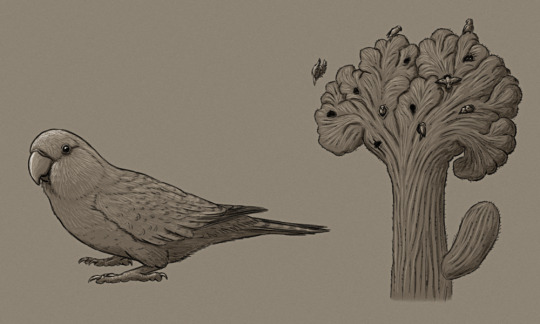
While Agapornis cheatsyi is still quite physically similar to its introduced ancestors, this lovebird has developed a close symbiotic relationship with the cactus Carnegiea ornipolis, a descendant of the modern saguaro.
Naturally fasciated, this cactus grows a splaying fan-like crown which the lovebirds excavate their shallow nest burrows into. Feeding on the cactus' fruit in early summer, the lovebirds then disperse the seeds via their droppings – a process that significantly improves propagation chances, both due to the birds commonly foraging and defecating around suitable nurse plants and the passage through their gut speeding up germination.
———
Someone calling themself "LB" asked for some "flying afrotherians":
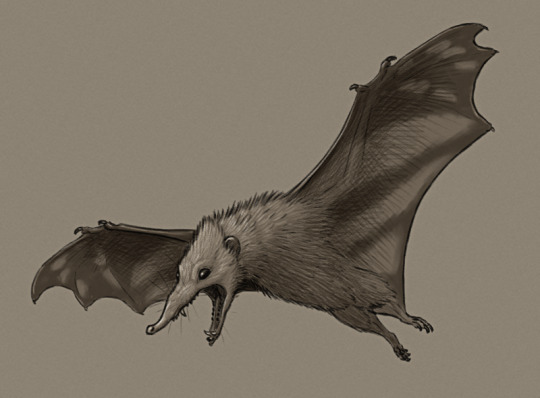
Elbeitandraka venenifer is a descendant of tree-climbing Malagasy tenrecs that developed gliding membranes – and its lineage is now just about achieving true powered flight.
About 25cm long (~10"), its proportionally short broad wings require it to fly very fast to generate enough lift for its weight. It mostly only actively flies when traveling between roosts and feeding sites (or when escaping from threats), alternating between gliding to save energy and flapping to recover altitude.
It's an opportunistic omnivore, crawling around in the tree canopy foraging for vegetation, fruits, fungi, invertebrates, and the occasional smaller vertebrate, using its flexible sengi-like nose to probe around in crevices.
Much like modern common tenrecs it's capable of hibernating for months at a time through periods of scarce food availability. It also accumulates alkaloid toxins in its body from its arthropod prey, advertising its unpalatability to predators with bold contrasting warning coloration on its wing membranes.
———
And here's a combination of a couple of anonymous requests for both "flying heterodontosaurs" and "dragons with hind leg wings, a la sharovipteryx":
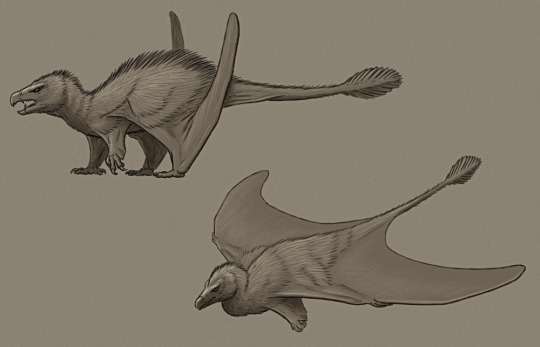
Inversodraco rapax is a highly specialized Jurassic descendant of heterodontosaurids that took to climbing and gliding, developing delta-wing-like membranes on their hindlimbs convergently similar to those of the earlier sharovipterygids.
Around 75cm long (~2'6"), it has unusually flexible hip joints for a dinosaur, able to splay its legs out to the sides to deploy wings supported by an elongated outer toe on each foot. Its arms form small forewings for stability, and its long tail ends in a vane of stiffened feathers that aid in steering.
Unlike its herbivorous-to-omnivorous ancestors it's primarily a carnivore, swooping down onto small prey and grabbing it with its talon-like forelimbs.
#spectember#spectober#spectember 2023#speculative evolution#lovebird#parrot#bird#saguaro#cactus#plant#tenrec#afrotheria#mammal#heterodontosaurid#ornithischia#dinosaur#art#science illustration#look if any mammal is going to copy bats' homework it's going to be tenrecs
307 notes
·
View notes
Text
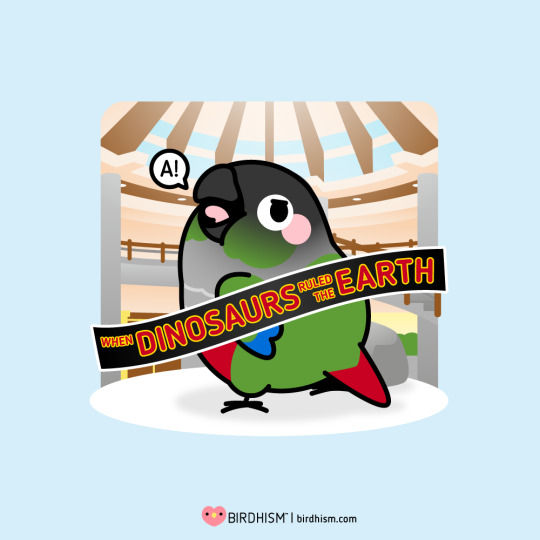
#jurassic june#dinosaurs#cute#jurassic park#conure#parrot#green cheek conure#birblr#birb#kawaii#birds#animals#bird#parrots#funny#art#illustration#artist#hello kitty
295 notes
·
View notes
Text


Pegomastax was an odd, little dinosaur that lived in South Africa around 200 million years ago. It had a parrot-like beak equipped with sharp teeth, including a distinctive pair of fangs. Its specialized teeth and jaw were likely used for chewing tough vegetation. Strong hind legs suggest it was an agile runner, capable of quick bursts of speed. Its body was covered in bristle-like structures, resembling the quills of a porcupine, adding to its peculiar appearance.
#pegomastax#dinosaur#dinosaurs#paleoart#paleontology#prehistoric#jurassic park#jurassic#creature#parrot#erockrogers#erock
32 notes
·
View notes
Text
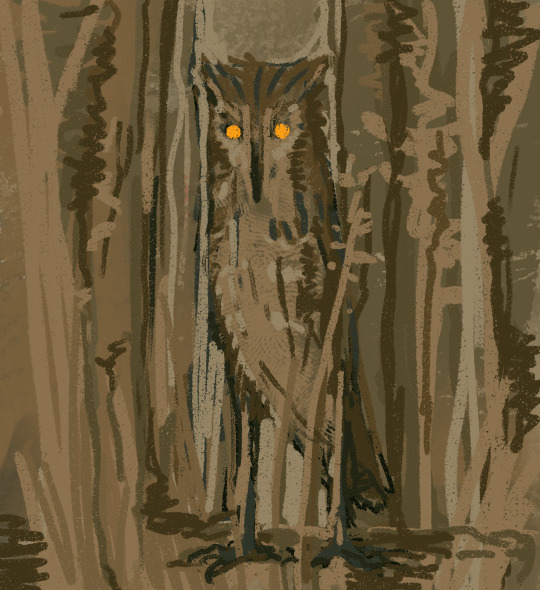
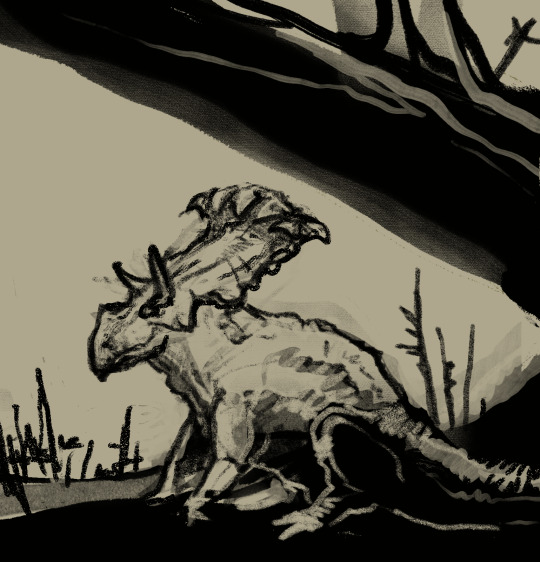
couple of birds for last night's paleostream (Sao Miguel Scops Owl, Kosmoceratops)
#paleostream#paleoart#paleoblr#dinosaurs#kosmoceratops#there was also a parrot. but i didnt like those as much so im keeping them to myself#procreate#digital art
141 notes
·
View notes
Text
huge WUEWUEWUE bird my beloved
(x)
#Path of Titans#PathofTitans#PoT#achillobator#raptors#dinosaurs#dinosaur#dinosaur game#video#Gumi the parrot
117 notes
·
View notes
Text
Not enough people understand the true nature of Jurassic Park methinks. Can it be enjoyed as a dinosaur horror? Absolutely. But I personally think it's much more enjoyable as a biological sci-fi. These aren't dinosaurs, they are biological monsters made in the shape of dinosaurs. They cut corners, they used frog DNA to fill in what they didn't have. John Hammond brought these experts along to see if their reactions would be "Oh my god that's a dinosaur" and then moved along when it was exactly that. But idk, that's just me.
#if you wanna see accurate dino horror#i absolutely recommend the twitter series by Archesuchus#DMuted has some videos on it and i recommend you watch those if you cant or dont wanna go to 'x'#jurassic park#jurassic world#michael crichton#jurassic park book#dinosaur#i think dino horror is best when it acknowledges them as they are#birds#big flightless birds#except for pteradons#those are flightFUL#flightful? is that? idk#pterosaur#AND MAKE THEM FEATHERY DAMMIT#also#the idea of a dinosaur being able to mimic sounds#like how ravens and parrots do#is AWESOME#prehistoric#scifi#scifi horror#i coin new term: Bi-Fi#bio fiction#its like science fiction but more specific#and probably already coined#dino horror#unfiction#weird birds
147 notes
·
View notes
Text
I reject the false dichotomy between Pigeon Lovers and Parrot Lovers
Both are amazing, both are wonderful, both are perfect
Reblog if you too love BOTH pigeons AND parrots!
888 notes
·
View notes
Text

Realised I haven’t posted in yonks so uh
Have this raptor coloured like a galah
32 notes
·
View notes
Text
"Dinosaur" desk pal asmr.
27 notes
·
View notes
Text
Im feeling generous, so here’s
All of this weeks homeworm art

Yellow tailed melanids
Melanornis xanthocaudis

Southern megabird
Titanornis gigantis
Struthiopsittacidae indet.
Passeripsittacidae indet.

Dome headed flower eater
Pachycephalogekko ferrucephalis

Ocean grydle
Xenopelagis ichthyomorphis

Striped Redneck
Erythrocephalis migratorius
Spotted sea dragon
Pelagodraco septentris
Western Pilotpole
Ductogirinus naucrates
Black tailed albarrots
Ardeapsittacis diomedus

Tiger sharkpole
Squalogyrinus tigrinus
Eastern Pilotpole
Ductogyrinus striatus

Digging finpole
Fossopterygius paternis
#speculative biology#speculative evolution#lmao#spec evo#original species#tadpoles#tadpole#gecko#crested gecko#budgie#parrot#budgerigar#banded bullfrog#alien#art#digital artwork#myart#water#i love drawing#:)#iridescent#crow#baby bird#baby dinosaurs#claw#hoatzin#dinosaur art#technically#project homeworld#homeworld
20 notes
·
View notes
Text
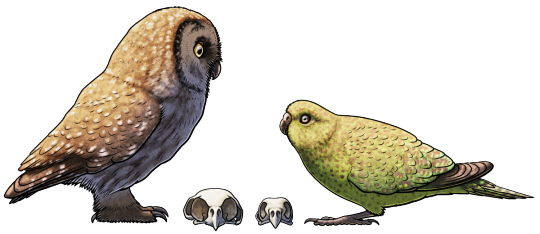
Strange Symmetries #23: Convergent Earvolution
Although it's not visible externally, owls have one of the most striking modern examples of asymmetry. The ears of many species are uneven, with the right ear opening positioned higher up than the left, giving them the ability to pinpoint the sounds of their prey much more accurately.
But surprisingly this isn't a unique anatomical trait that only ever evolved once in their common ancestor.
Instead, multiple different lineages of owls have actually convergently evolved wonky ears somewhere between four and seven separate times.
The boreal owl (Aegolius funereus), also known as Tengmalm's owl, is a small 25cm long (~10") true owl found across much of the northern parts of both Eurasia and North America. While most other owls' asymmetrical ear openings are formed just by soft tissue, the boreal owl's lopsided ears are actually visible in the bones of its skull.
But despite how many times owls have convergently evolved asymmetrical ears, and how successful this adaptation has been for them, for a long time it seemed to be something that no other animals have ever mimicked.
In the early 2000s asymmetric ears were reported in the skulls of some troodontid dinosaurs, which seem to have been nocturnal hearing-based hunters similar to owls, but proper details on this feature still haven't been formally published.
Then, just a couple of weeks ago, another example was finally announced.
The night parrot (Pezoporus occidentalis) is a small ground-dwelling parrot found in Australia, close to the same size as the boreal owl at around 22cm long (~9"). Critically endangered and very elusive, it's rarely seen and little is known about it – and it was presumed extinct for much of the 20th century, until more recent sightings of living individuals confirmed that the species is still hanging on.
Recent studies of preserved museum specimens have revealed that it seems to have poor night vision but excellent hearing, and that its right ear opening is noticeably asymmetrical, bulging out sideways from its skull. Much like owls the night parrot relies on acute directional hearing to navigate in darkness, but since its diet consists mainly of seeds it's probably not using this ability to locate food sources. Instead it may be listening out to keep track of the precise locations of other parrots, and for the approach of predators – so its sharp sense of hearing may be the reason this unique bird has so far just barely managed to survive the presence of invasive cats and foxes.
———
NixIllustration.com | Tumblr | Twitter | Patreon
#science illustration#not paleoart#boreal owl#tengmalm's owl#aegolius funereus#strigidae#strigiformes#owl#night parrot#pezoporus occidentalis#psittaculidae#psittaciformes#parrot#dinosaur#bird#modern dinosaurs#art#a superb owl#endangered species#convergent evolution#still seems to be an adaptation unique to birds and stem-birds tho
1K notes
·
View notes
Text
Paleostream 23/03/2024
WHOOPS GUESS WHO FORGOT TO POST YESTERDAY'S #Paleostream SKETCHES!!!
yesterday we drew Ectopistes migratorius (Passenger Pigeon), Eclectus infectus (Oceanic Eclectus), Kosmoceratops, and Otus frutuosoi (São Miguel scops owl)

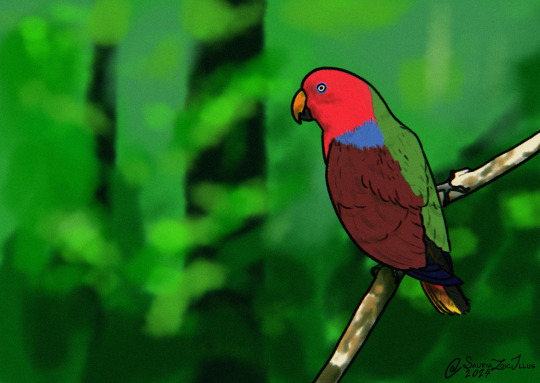
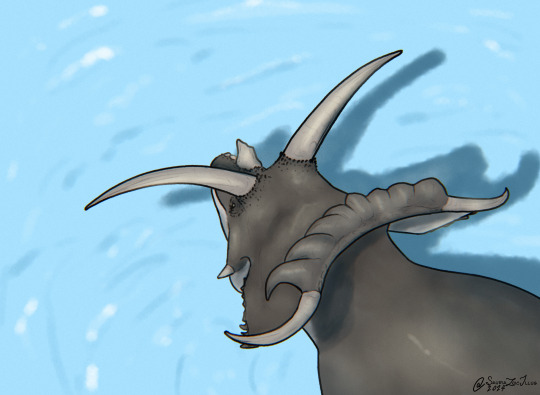

#Paleostream#paleoart#paleontology#digital art#artists on tumblr#digital artwork#palaeoart#digital illustration#id in alt text#sciart#dinosaur#bird#birds#bird art#pigeon#owl#parrot#Ectopistes migratorius#Passenger Pigeon#Eclectus infectus#Oceanic Eclectus#Kosmoceratops#ceratopsian#Otus frutuosoi#Sao Miguel scops owl#paleobr#palaeobr
48 notes
·
View notes